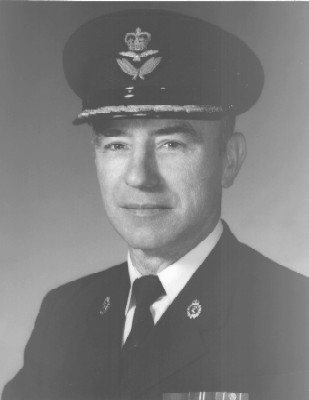

Defense Medical Association of Canada, Ottawa, Ontario, Canada
National Defence Medical Center, Ottawa, Ontario
Directorate of Medical Plans and Requirements, Office of the Surgeon General, Canadian Forces, Ottawa
In 1969, as a recently commissioned officer in the Royal Canadian Air Force (RCAF), I was selected for the program despite my lack of an undergraduate degree. The previously negotiated arrangements were being brought to an end, because Masters programs were now more readily accessible at Canadian universities. Therefore, I was the last Canadian candidate to attend the Baylor program. Although lacking the academic prerequisites, I maintained a good standing in the course and was awarded a diploma, but I did not do an internship nor was I granted the Baylor degree.
I had been in the RCAF for twenty years, nineteen of them as a non-commissioned officer. During all these years , including a four-year tour of duty in Europe, I served in some aspect of medical administration. Nine of those years were as an instructor in medical administration for medical technicians and teaching basic training courses for new entry physicians and nurses. My experience and strong motivation for formal health care administration training undoubtedly led to my selection.
Value of the U.S. Army-Baylor University Program
The program material was just what I needed to function more effectively in medical administration and staff officer roles. Systems analysis and operations research training provided valuable tools for working in a milieu under constant threat of funding reduction. They were invaluable in helping to make the best decisions on the use of limited resources. Other areas of hospital administration, such as budgeting, staffing, material management, housekeeping etc., enabled me to work in a definitive care general hospital with confidence.
The Social Aspects
The social aspects of the program, the intermingling with professionals of other medical disciplines with much wider experiences added value unattainable by any other means. These associations broadened my horizons and enabled me to see health care in a military setting and under combat conditions with much greater clarity.
I was accorded every hospitality during the year at Fort Sam Houston. The faculty, classmates and the staff of the Foreign Student Liaison Office were generous to a fault. I was promoted to Captain while on the course and, although this was a mere formality, the class members made it seem a momentous occasion. But that is not to say that they would miss an opportunity to poke a little fun from time to time. Here is an incident that illustrates this point.
Classes at Fort Sam Houston began at 0700 hours, an ungodly hour for a Canadian accustomed to sleeping in until 6:30. On one or two occasions, I was late for morning classes during the first semester. On break-up for the Christmas holidays, I was called to the front of the class. My classmates, I was told, thought my tardiness might have been caused by a faulty alarm clock. Then, to the great amusement of the class, I was presented with a live rooster on a leash. Red-faced, I had to walk the rooster across the quadrangle to coffee that morning. A sympathetic classmate took the bird off my hands at the end of the day, bringing the “fowl” deed to an end. Needless to say, I was never late during the second semester.
There was always good-natured ribbing of the “nominal foreign student” and, tongue-in-cheek, they would ask if they should translate this or that from American into Canadian. But when I had to be away on orientation tours, fellow classmates kept detailed notes on lectures I may have missed, allowing me to keep up my studies. A number of these classmates remain close friends to this day.
First Duty Assignment
Upon graduation in June 1970, I was assigned to the Canadian Forces Hospital Kingston in Ontario. This was a definitive care facility that was responsible for the personnel of Canadian Forces Base Kingston, the Cadets of the Royal Military College, as well as inmates from three nearby federal penitentiaries. As the assistant to the Hospital’s Administrative Officer, I applied my new-found tools to the management of the physical plant, medical materiel and food services for the next two years. During this tour of duty, I was also assigned No. 1 Canadian Field Hospital, a 200-bed, air-transportable, surgical field hospital. I served with this unit on its training exercises, acting as assistant administrative officer and emplaning officer for its air deployment.
With a promotion to Major, I went to the Office of the Surgeon General in the Directorate of Medical Plans and Requirements. Here, I made greater use of the systems analysis and operations research tools I acquired on the course when I was tasked to monitor the distribution and optimal use of medical manpower throughout the Canadian Forces. This was the job for which the program had so well prepared me. The Canadian Forces Medical Services underwent two major manpower cuts during my tour with the Surgeon General’s Office. The U.S. Army-Baylor University training was of inestimable value in working out the mandated reductions with the minimum impairment of health care delivery and operational medical support.
It was only on approaching retirement that, as a Major, I requested and was granted an appointment to the staff of the National Defence Medical Center in Ottawa, Ontario, where I planned to refresh my hospital management skills until my retirement in1981.
Professional Associations
During my military service, I was a member of the Canadian College of Health Services Executives. Following my retirement, I became active with the Defence Medical Association of Canada, first as president of the local branch and subsequently on the national executive as Treasurer, an appointment I held for seven years.
Conclusion
There is no doubt that the training received on the U.S. Army-Baylor University Program in Health Care Administration made me a more effective officer and health care administrator, and enabled me to provide a valuable service to the Canadian Forces Medical Services and to Canada.